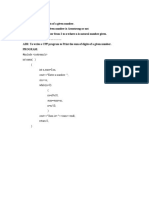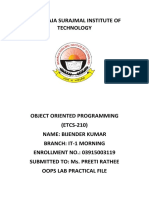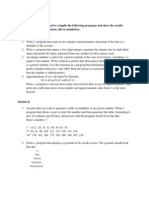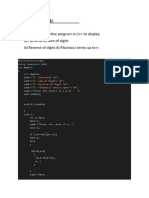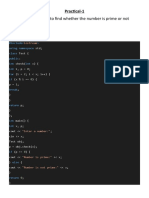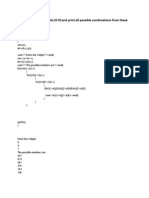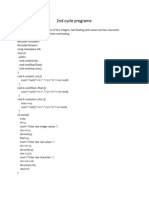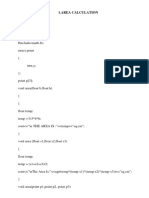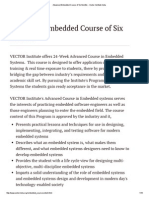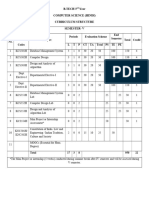S.No. PROJECTS PAGE NO.
1. Develop a program that uses a
`while` loop to print all prime
numbers between 1 and 100
2. Write a program that reads three
numbers and uses an `nesting if-else`
statement to determine the largest
number.
3. Create a function that takes an array
of integers and returns the sum of all
prime numbers.
4. Write a recursive function to calculate
the Fibonacci series up to `n` terms.
5. Implement a function to search for a
value in a two dimensional array and
return its position.
6. Implement a program to calculate the
square root of a number using a
mathematical function.
1
�INDEX
2
� 7. Describe how you would use
mathematical functions to solve a
quadratic equation.
8. Write a program to create an array of
objects for a class that stores student
information.
9. Write a program to implement this
pointer in c++.
10. Write a program to demonstrate the
use of a friend function to access
private members of a class.
11. Write a program that demonstrates
object assignment and passing
objects to functions in C++.
12. Develop a program that
demonstrates the use of dynamic
allocation operators `new` and
`delete` to manage memory in a
class.
13. Create a class with a destructor that
releases dynamically allocated
memory.
3
�14. Develop a program that
demonstrates function overloading
by creating multiple functions with
the same name but different
parameters.
15. Create a base class Person with
member variables for name and
age, and a method displayInfo().
Derive a class Student from Person
with an additional member variable
for the
student ID and override the
displayInfo() method to include the
student.
16. Write a program to overload the '+'
operator to add two complex
numbers.
17. Implement a program that
demonstrates the concept of virtual
functions and late binding.
18. Write a program to overload the
'==' operator using a friend
function to compare two strings.
4
�19. Write a class Student with private
data members name and age.
Implement a copy constructor that
initializes a new Student object with
the values of an existing Student
object. Test your copy constructor in
a main function.
20 Print the following pattern :
A
ABC
ABCDE
ABCDEFG
ABCDE
ABC
A
5
�1. Develop a program that uses
a `while` loop to print all
prime numbers between 1
and 100
#include <iostream>
using namespace std;
int main() {
int num = 2;
while (num <= 100) {
bool isPrime = true;
int i = 2;
while (i * i <= num) {
if (num % i == 0) {
isPrime = false;
break;
}
i++;
}
if (isPrime) {
cout << num << " ";
}
num++;
}
return 0;
}
6
�2. Write a program that reads
three numbers and uses an
`nesting if-else` statement to
determine the largest number.
#include <iostream>
using namespace std;
int main() {
int a, b, c;
cout << "Enter three numbers: ";
cin >> a >> b >> c;
if (a >= b) {
if (a >= c)
cout << "The largest number is: " << a <<
endl;
else
cout << "The largest number is: " << c <<
endl;
} else {
if (b >= c)
cout << "The largest number is: " << b <<
endl;
else
cout << "The largest number is: " << c <<
endl;
}
return 0;
}
7
�3. Create a function that takes an
array of integers and returns the
sum of all prime numbers.
#include <iostream>
using namespace std;
bool isPrime(int n) {
if (n <= 1) return false;
for (int i = 2; i*i <= n; ++i) {
if (n % i == 0)
return false;
}
return true;
}int sumOfPrimes(int arr[], int size) {
int sum = 0;
for (int i = 0; i < size; ++i) {
if (isPrime(arr[i])) {
sum += arr[i];
}
}
return sum;
}
int main() {
int arr[] = {3, 4, 5, 6, 7, 8, 9, 11};
int size = sizeof(arr) / sizeof(arr[0]);
int primeSum = sumOfPrimes(arr, size);
cout << "Sum of prime numbers in the array: " <<
primeSum << endl;
return 0;
}
8
�4. Implement a function to search
for a value in a two dimensional
array and return its position.
#include <iostream>
using namespace std;
bool search(int arr[][3], int rows, int target, int &r, int &c)
{
for (int i = 0; i < rows; ++i)
for (int j = 0; j < 3; ++j)
if (arr[i][j] == target) {
r = i; c = j;
return true;
}
return false;
}
int main() {
int arr[2][3] = {{1, 2, 3}, {4, 5, 6}}, x, r, c;
cout << "Enter value: "; cin >> x;
if (search(arr, 2, x, r, c))
cout << "Found at (" << r << ", " << c << ")\n";
else
cout << "Not found\n";
return 0;
}
9
�5. Implement a program to
calculate the square root of a
number using a
mathematical function.
#include <iostream>
#include <cmath>
using namespace std;
int main() {
double num;
cout << "Enter a number: ";
cin >> num;
if (num < 0)
cout << "Square root of negative number is not real.\n";
else
cout << "Square root: " << sqrt(num) << endl;
10
�6. Describe how you would use
mathematical functions to solve
a quadratic equation.
#include <iostream>
#include <cmath>
using namespace std;
int main() {
double a, b, c, D, x1, x2;
cout << "Enter a, b, c: ";
cin >> a >> b >> c;
D = b*b - 4*a*c;
if (D > 0) {
x1 = (-b + sqrt(D)) / (2*a);
x2 = (-b - sqrt(D)) / (2*a);
cout << "Real and distinct roots: " << x1 << ",
" << x2 << endl;
} else if (D == 0) {
x1 = -b / (2*a);
cout << "Real and equal root: " << x1 << endl;
} else {
double realPart = -b / (2*a);
double imagPart = sqrt(-D) / (2*a);
11
� cout << "Complex roots: " << realPart << " ± "
<< imagPart << "i" << endl;
return 0;
12
�7. Write a program to implement
this pointer in c++.
#include <iostream>
using namespace std;
class Student {
private:
int id;
string name;
public:
// Setter method using 'this' pointer
void setData(int id, string name) {
this->id = id; // 'this->id' refers to class member
this->name = name; // 'name' is the parameter
}
void display() {
cout << "ID: " << id << ", Name: " << name <<
endl;
}
};
int main() {
Student s1;
s1.setData(101, "Rahul");
s1.display();
return 0;
}
13
�8. Write a program to create an
array of objects for a class that
stores student information
#include <iostream>
using namespace std;
class Student {
private:
int rollNo;
string name;
public:
void input() {
cout << "Enter roll number: ";
cin >> rollNo;
cout << "Enter name: ";
cin >> name;
}
void display() {
cout << "Roll No: " << rollNo << ", Name: " << name <<
endl;
}
};
int main() {
const int size = 3; // Number of students
Student students[size];
cout << "\n--- Enter Student Information ---\n";
for (int i = 0; i < size; ++i) {
cout << "\nStudent " << i + 1 << ":\n";
students[i].input();
}
cout << "\n--- Displaying Student Information ---\n";
for (int i = 0; i < size; ++i) {
students[i].display();
}
return 0;
}
14
�9. Write a program to demonstrate
the use of a friend function to
access private members of a
class.
#include <iostream>
using namespace std;
class Student {
private:
string name;
int marks;
public:
Student(string n, int m) {
name = n;
marks = m;
}
friend void displayStudentInfo(Student s);
};
void displayStudentInfo(Student s) {
// Can access private members directly
cout << "Name: " << s.name << ", Marks: " << s.marks << endl;
}
int main() {
Student s1("Rahul", 85);
displayStudentInfo(s1); // Call friend function
return 0;
}
15
�10. Write a program that
demonstrates object
assignment and passing objects
to functions in C++.
#include <iostream>
using namespace std;
class Person {
private:
string name;
int age;
public:
Person(string n = "Unknown", int a = 0)
{
name = n;
age = a;
}
void display() const {
cout << "Name: " << name << ", Age:
" << age << endl;
}
void setData(string n, int a) {
name = n;
age = a;
}
};
void showByValue(Person p) {
cout << "Inside showByValue(): ";
p.display();
}
16
� void showByReference(const Person
&p) {
cout << "Inside showByReference():
";
p.display();
}
int main() {
Person person1("jonathan", 25);
cout << "Original object (person1): ";
person1.display();
Person person2;
person2 = person1;
cout << "After assignment (person2
= person1): ";
person2.display();
showByValue(person1);
showByReference(person1);
return 0;
}
17
�11. Create a class with a destructor that
releases dynamically allocated memory.
#include <iostream>
using namespace std;
class Sample {
private:
int* data;
int size;
public:
Sample(int s) {
size = s;
data = new int[size];
for (int i = 0; i < size; ++i)
data[i] = i * 10;
}
void display() const {
for (int i = 0; i < size; ++i)
cout << data[i] << " ";
cout << endl;
}
~Sample() {
delete[] data;
cout << "Destructor called. Memory released." <<
endl;
}
};
int main() {
Sample obj(5); obj.display();
return 0;
}
18
�12.student ID and override the
displayInfo() method to include
the student.
#include <iostream>
using namespace std;
class Person {
protected:
string name;
int age;
public:
Person(string n, int a) {
name = n;
age = a;
}
virtual void displayInfo() {
cout << "Name: " << name << ", Age: " << age << endl;
}
};
class Student : public Person {
private:
string studentID;
public:
Student(string n, int a, string id) : Person(n, a) {
studentID = id;
}
void displayInfo() override {
cout << "Name: " << name << ", Age: " << age << ",
Student ID: " << studentID << endl;
}
};
int main() {
Student s("Rahul", 18, "R123456");
s.displayInfo();
return 0;
19
� 13. Write a program to overload
the '+' operator to add two complex
numbers.
#include <iostream>
using namespace std;
class Complex {
private:
float real;
float imag;
public:
Complex(float r = 0, float i = 0) {
real = r;
imag = i;
}
Complex operator+(const Complex& other) {
return Complex(real + other.real, imag + other.imag);
}
void display() const {
cout << real << " + " << imag << "i" << endl;
}
};
int main() {
Complex c1(3.5, 2.5);
Complex c2(1.5, 4.5);
Complex result = c1 + c2;
result.display();
return 0;
}
20
�14. Implement a program that demonstrates
the concept of virtual functions and late
binding.
#include <iostream>
using namespace std;
class Animal {
public:
virtual void sound() {
cout << "Animal makes a sound" << endl;
};
class Dog : public Animal {
public:
void sound() override {
cout << "Dog barks" << endl;
};
class Cat : public Animal {
public:
void sound() override {
cout << "Cat meows" << endl;
21
�};
int main() {
Animal* a;
Dog d;
Cat c;
a = &d;
a->sound();
a = &c;
a->sound();
return
22
�15. Write
a program to overload the '==' operator
using a friend function to compare two strings.
#include <iostream>
#include <cstring>
using namespace std;
class MyString {
private:
char str[100];
public:
MyString(const char* s = "") {
strcpy(str, s);
friend bool operator==(const MyString& s1, const MyString& s2);
void display() const {
cout << str << endl;
};
bool operator==(const MyString& s1, const MyString& s2) {
return strcmp(s1.str, s2.str) == 0;
23
�int main() {
MyString s1("hello");
MyString s2("hello");
MyString s3("world");
if (s1 == s2)
cout << "s1 and s2 are equal" << endl;
else
cout << "s1 and s2 are not equal" << endl;
if (s1 == s3)
cout << "s1 and s3 are equal" << endl;
else
cout << "s1 and s3 are not equal" << endl;
return 0;
24
�16. Write a class student privite. Implement a copy
constructor that initializes a new Student object
with the existing Student object. Test your copy
constructor in a main function.
#include <iostream>
using namespace std;
class Student {
private:
string name;
int age;
public:
Student(string n, int a) {
name = n;
age = a;
Student(const Student& s) {
name = s.name;
age = s.age;
25
� void display() const {
cout << "Name: " << name << ", Age: " << age << endl;
};
int main() {
Student s1("Rahul", 18);
Student s2 = s1;
s1.display();
s2.display();
return 0;
26
�17. Print the following pattern :
A
ABC
ABCDE
ABCDEFG
ABCDE
ABC
A
#include <iostream>
using namespace std;
int main() {
int n = 4;
for (int i = 1; i <= n; i++) {
for (int j = n - i; j > 0; j--)
cout << " ";
for (char ch = 'A'; ch < 'A' + 2 * i - 1; ch++)
cout << ch << " ";
cout << endl;
}
for (int i = n - 1; i >= 1; i--) {
for (int j = 0; j < n - i; j++)
cout << " ";
for (char ch = 'A'; ch < 'A' + 2 * i - 1; ch++)
cout << ch << " ";
cout << endl;
}
return 0;
}
27
�18. Write a recursive function to calculate the
Fibonacci series up to `n` terms.
#include<iostream>
using namespace std;
int fibonacci(int n) {
if (n <= 1)
return n;
return fibonacci(n - 1) + fibonacci(n - 2);
}
int main() {
int n;
cin >> n;
for (int i = 0; i < n; i++) {
cout << fibonacci(i) << " ";
}
return 0;
}
28
� Develop a program that demonstrates the use of
19.
dynamic allocation operators `new` and `delete` to
manage memory in a class.
#include<iostream>
using namespace std;
class Student {
string* name;
int* age;
public:
Student(const string& n, int a) {
name = new string(n);
age = new int(a);
}
void display() {
cout << "Name: " << *name << ", Age: " << *age << endl;
}
~Student() {
delete name;
delete age;
}
29
�};
int main() {
Student* s = new Student("Rahul", 21);
s->display();
delete s;
return 0;
}
30
�20. Develop
a program that demonstrates function
overloading by creating multiple functions with the
same name but different parameters.
#include<iostream>
using namespace std;
class Demo {
public:
void display() {
cout << "No parameters" << endl;
}
void display(int x) {
cout << "Integer parameter: " << x
<< endl;
}
void display(double x) {
cout << "Double parameter: " << x
<< endl;
}
void display(string str, int times) {
for (int i = 0; i < times; i++) {
cout << str << endl;
}
}
31
�};
int main() {
Demo obj;
obj.display();
obj.display(10);
obj.display(3.14);
obj.display("Function Overloading", 2);
return 0;
}
32
